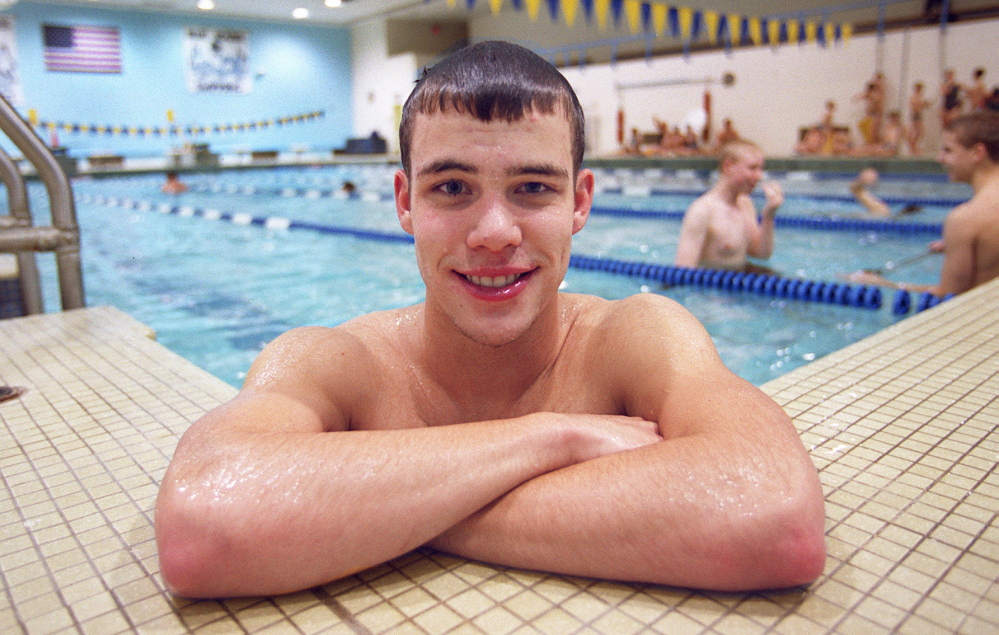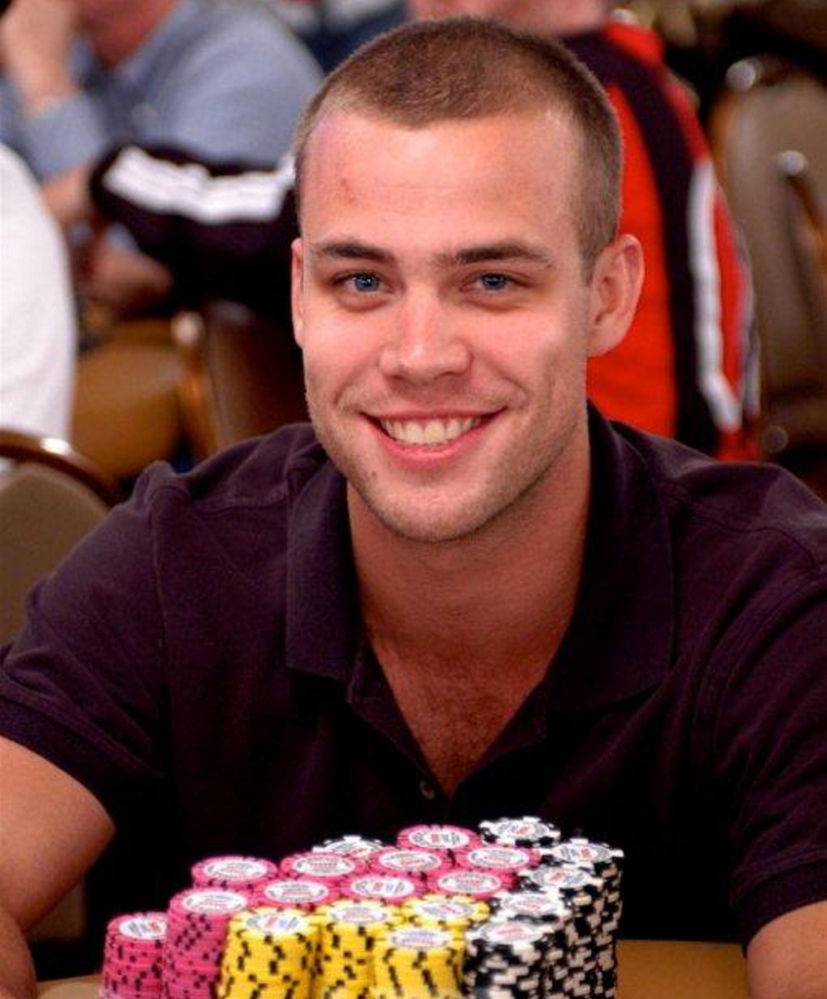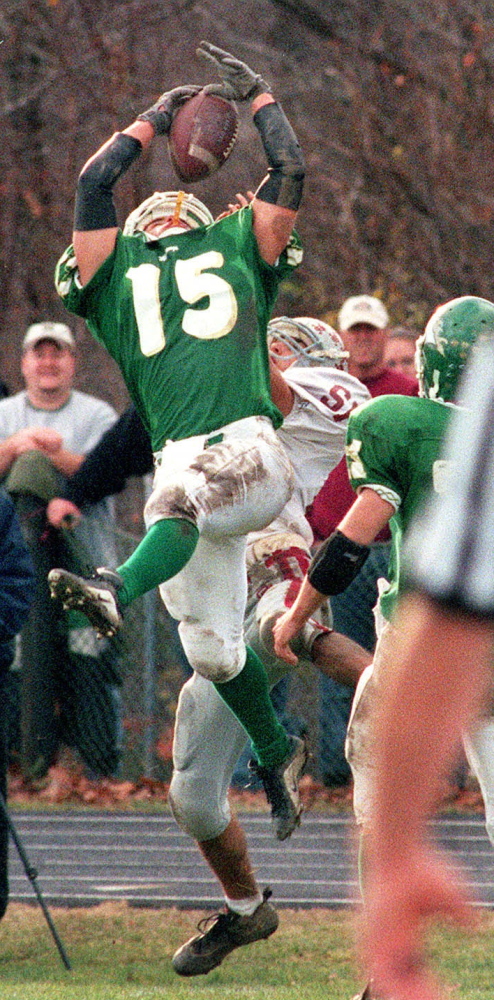Matt Woodward had just finished his sophomore season swimming for the University of Massachusetts, so getting a summer job as a lifeguard in his hometown of Waterboro was a natural fit.
Woodward was also moonlighting that summer. The state champion record-setting swimmer, and running back on Massabesic High’s 2000 Class A championship football team, was fast becoming a studious, serious poker player.
“I had some high school friends that found a card game that was being played in a pool hall in Sanford,” Woodward said. “That was kind of our rival town. I was really interested. They had played a handful of times and did pretty well so I decided to get in on the action.”
With help from a purchase at a Portland bookstore that detailed the ins-and-outs of a game called Limit Hold’em, Woodward quickly realized that poker played well took a substantial skill level.
“And the people we were playing against were not strong players whatsoever.”
Over the summer, Woodward pocketed an estimated $3,000 from the Sanford card game. He decided to skip his junior year of swimming at UMass and instead dove headlong into making a living as a professional poker player.
“At the time I was lifeguarding at Camp Laughing Loon in Waterboro,” he recalled. “As it turned out that’s the last real job I’ve had.”
Now 32 and living in Seal Beach, California, about 40 miles south of Los Angeles, Woodward admits that making a living playing poker has been a roller-coaster ride.
He’s gone broke a couple of times (while in college and again at age 24 while living a high-rise lifestyle in Manhattan) and he’s hit the big score. In 2009 he won over $1.7 million for finishing second in a single tournament in Monte Carlo.
He is the leader among players from Maine with career tournament earnings of $2,311,059.
Early this week, Woodward will play his opening hand of what he hopes will be a long run at the $10,000 buy-in World Series of Poker Main Event tournament in Las Vegas.
The main event at the World Series of Poker (WSOP) is so large (annually between 5,000 and 8,000 entrants) there are three starting flights – on Sunday, Monday and Tuesday. If players survive their first day with chips left, they advance to a second day Wednesday or Thursday. All fields are combined for Day 3 on Friday. From that point, play continues each day until only nine players remain at the end of July 14. Those nine – assured of a big payday – return to Las Vegas in November for the November Nine final tournament.
Last year, Woodward’s friend, Martin Jacobson of Sweden, won $10 million as the WSOP champion.
WHEN LUCK INTERFERES
How long will Woodward last? That’s where luck – variance as poker players call it – comes into the equation. In a tournament, the best player at a table doesn’t always win.
“I’ve been knocked out a couple times on the first day and I’ve also cashed a couple of times (at the WSOP),” Woodward said. “Just to make it to the money takes four days.”
In 2012, Woodward won $44,655 in the main even, finishing 217th out of 6,598.
In his career at WSOP events (the annual series actually consists of many smaller tourneys leading up to the main event), Woodward has cashed 22 times for a total of $382,455.
Woodward has played in “about 25” of this year’s 67 preliminary tournaments and cashed three times, including one fifth-place finish worth $52,807.
“Any time you make the final table, it’s disappointing to get that close to that big score because the prize pool is so heavily weighted,” Woodward said. “But it’s fun to get there and give yourself a chance.”
STARTING WITH BOARD GAMES
When Ron and Carolyn Woodward’s only son told them he intended to become a pro poker player, “it was a little weird,” Carolyn Woodward admits.
The Woodwards still live on the same street in Waterboro where they have been for more than 40 years. Carolyn now has a ready response when asked about her son’s profession.
“If he had just said he was going to play professional golf no one would have batted an eye,” Carolyn said. “It’s a skilled game and you have to be pretty smart to do well.”
While his parents aren’t gamblers (“We hate casinos,” Carolyn Woodward said), Matt Woodward spent hours playing chess, backgammon, cribbage and a variety of other games at home.
“Especially with my dad, we were always competing hard,” he said. “Now it’s cribbage and our family is big on playing board games even to this day.”
CASHING IN AT CASH GAMES
Woodward honed his poker skills playing real money games online. He also went through several “tough” stretches that depleted his savings.
Instead of quitting, Woodward kept playing.
After his bust year in Manhattan, he relocated to a smaller place in New York City in the East Village.
He was still playing primarily online but his results improved dramatically.
“Having my own place, I was able to focus and had one of my best years ever,” he said. “I had a really professional year and improved a lot. That year I went from good to great, relative to the field at the time, and I had a big year.”
Federal and state laws have made big-money online games less available, especially after the federal government shut down three major websites in 2011.
Now Woodward plays much of his poker in casinos, competing in cash games.
Woodward said prefers cash games – where a player buys chips used as cash value, as opposed to tournaments where all players get the same amount of chips for the same buy-in and play until those chips are gone – for two reasons.
“One is the freedom to come and go as you want,” Woodward said. “It allows me to get my sleep, run errands, eat, go to the gym and come in mentally ready to play. Even though I don’t consider poker a sport, I try to approach it the same way so I like to have time to prepare.
“The other thing is it’s really tough to count on tournament winnings to make a living. The amount of variance is so much greater at a tournament. You really have to get lucky to have a top-three finish. In a cash game, a good player can count on going home with money 70 to 75 percent of the sessions you play.”
Cash game earnings are not counted in the various poker rankings. For that reason, Woodward and most of his peers scoff at the rankings.
Woodward is ranked 1,243rd (out of 223,747) in the Global Poker Index Ranking. He ranks 284th on the all-time United States list and 451st in career earnings internationally.
Woodward said it would be “pretty fair” to call his annual earnings from poker a “six-figure income.”
Woodward’s background as a high school football player and competitive swimmer has helped him succeed at felt-lined tables across the world, especially as the level of competition has increased, he said.
“It’s just that mental toughness you learned through competitive sports,” Woodward said. “No matter how good you are as a poker player, you’re going to have days, weeks, months, maybe even years where you lose, and to continue to show up when things aren’t going well is a really important attribute.”
Copy the Story Link
Send questions/comments to the editors.






Success. Please wait for the page to reload. If the page does not reload within 5 seconds, please refresh the page.
Enter your email and password to access comments.
Hi, to comment on stories you must . This profile is in addition to your subscription and website login.
Already have a commenting profile? .
Invalid username/password.
Please check your email to confirm and complete your registration.
Only subscribers are eligible to post comments. Please subscribe or login first for digital access. Here’s why.
Use the form below to reset your password. When you've submitted your account email, we will send an email with a reset code.